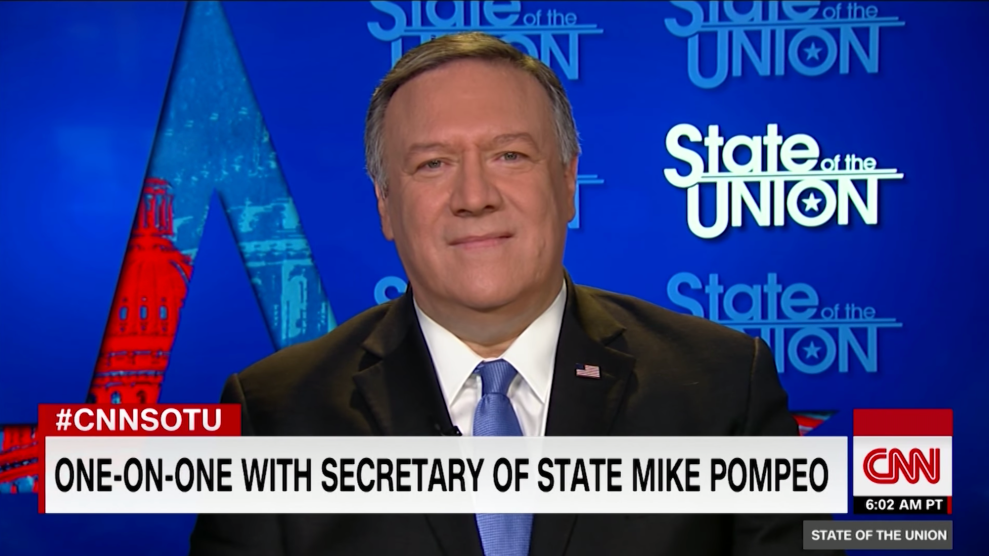
Secretary of State Mike Pompeo speaks on CNN's "State of the Union" on January 5, 2020./CNN
President Donald Trump sent a string of tweets on Saturday night threatening further military action against Iran—including strikes on key cultural sites, which could be considered a war crime under international law—in response to Iran’s promised retaliation for the killing of its most powerful military official last week. On Sunday, in appearances on the morning political shows, Secretary of State Mike Pompeo signaled his support for that strategy.
Trump tweeted that his administration had identified 52 Iranian sites—a number, he explained, that represents the 52 Americans taken hostage in the American embassy in Tehran in 1979—to “HIT VERY FAST AND VERY HARD” if Iran strikes US assets as retribution against a US airstrike that killed Maj. General Qassim Suleimani, Iran’s top commander. Some of the sites, Trump wrote, are “at the very high level & important to Iran & the Iranian culture.” Both the Department of Defense’s Law of War Manual and the internationally agreed-upon Geneva Conventions prohibit attacks on recognized historic monuments, works of art, or places of worship known as sites of cultural or spiritual heritage.
….targeted 52 Iranian sites (representing the 52 American hostages taken by Iran many years ago), some at a very high level & important to Iran & the Iranian culture, and those targets, and Iran itself, WILL BE HIT VERY FAST AND VERY HARD. The USA wants no more threats!
— Donald J. Trump (@realDonaldTrump) January 4, 2020
When asked about the tweets on CNN’s State of the Union, Pompeo backed the president. “The American people should know that we will not waver,” he said. “We will be bold in protecting American interests, and we will do so in a way that is consistent with the rule of law.” When host Jake Tapper asked about the potential violation of international law, Pompeo did not express concern over the chosen cultural site targets.
The Trump administration has maintained that killing Suleimani had been a necessary step to prevent Iran from carrying out an “imminent” attack that would have left hundreds dead. On Saturday, the New York Times reported that some administration officials had been concerned that the intelligence about that planned attack had been thin. According to the Times, military officials gave Trump a number of options of how to proceed in response to that threat—including killing Suleimani—and were reportedly shocked when he chose that option, which they deemed extreme. Pompeo and Vice President Mike Pence reportedly had been among the most hawkish in their encouragement of the strike.
In an appearance on CBS’s Face the Nation later Sunday morning, however, Pompeo was evasive when host Margaret Brennan asked if the threat had been removed after the strike against Suleimani. “There are constant threats,” Pompeo said. “We are focused on delivering a strategy.”

















